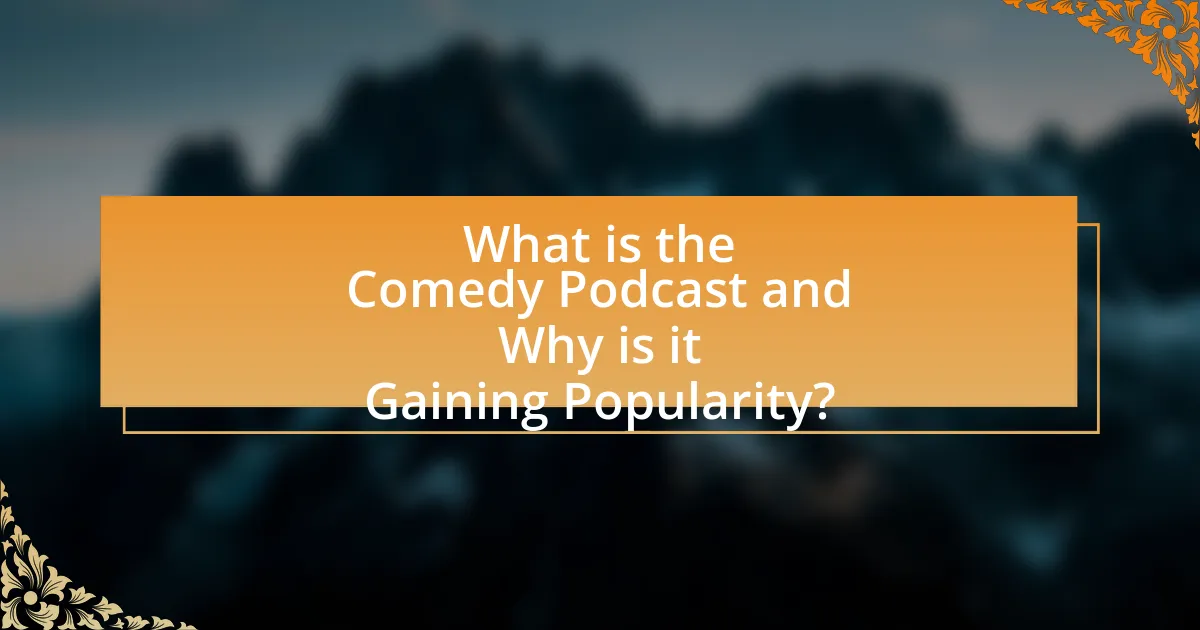The article examines the rise of comedy podcasts as a significant medium in contemporary entertainment, highlighting their increasing popularity due to accessibility, technological advancements, and the ability to foster community engagement. It explores the historical factors that contributed to their emergence, the defining characteristics that differentiate them from traditional radio shows, and the elements that make them engaging. Additionally, the article discusses the challenges faced by podcasters, the impact of comedy podcasts on traditional comedy formats, and the evolving themes and trends within the genre. Finally, it outlines future prospects for comedy podcasts, including audience preferences and strategies for aspiring comedians to succeed in this competitive landscape.

What is the Comedy Podcast and Why is it Gaining Popularity?
A comedy podcast is an audio program that features humorous discussions, storytelling, or performances, often hosted by comedians or entertainers. The popularity of comedy podcasts is increasing due to their accessibility, the rise of on-demand audio consumption, and the ability to connect with audiences on a personal level. According to a 2021 report by Edison Research, 41% of Americans aged 12 and older have listened to a podcast in the past month, with comedy being one of the most popular genres. This trend is further fueled by social media promotion and the ability for listeners to engage with hosts, creating a community around shared humor.
How did the comedy podcast emerge as a popular medium?
The comedy podcast emerged as a popular medium due to the rise of digital audio platforms and the increasing accessibility of podcasting technology. In the early 2000s, the advent of the iPod and subsequent mobile devices allowed users to easily download and listen to audio content on-the-go. This shift in technology coincided with a growing demand for diverse and on-demand entertainment options, leading to a surge in podcast creation. By 2019, statistics indicated that over 50% of the U.S. population had listened to a podcast, with comedy being one of the most popular genres, as evidenced by shows like “Comedy Bang! Bang!” and “The Joe Rogan Experience,” which attracted millions of listeners. The combination of relatable humor, the ability to connect with audiences directly, and the low barrier to entry for creators solidified comedy podcasts as a significant and enduring medium in the entertainment landscape.
What historical factors contributed to the rise of comedy podcasts?
The rise of comedy podcasts can be attributed to several historical factors, including the advent of the internet, the proliferation of smartphones, and the decline of traditional media. The internet provided a platform for creators to distribute content without the constraints of traditional broadcasting, allowing comedians to reach niche audiences directly. The widespread adoption of smartphones facilitated on-the-go listening, making podcasts more accessible than ever. Additionally, as traditional media outlets faced challenges in adapting to changing consumer preferences, many comedians turned to podcasts as an alternative medium to connect with fans and showcase their work. This shift was further supported by the growing popularity of platforms like Apple Podcasts and Spotify, which helped to legitimize and promote the podcasting format.
How has technology influenced the growth of comedy podcasts?
Technology has significantly influenced the growth of comedy podcasts by providing accessible platforms for creators and listeners. The advent of smartphones and high-speed internet has enabled easy recording, editing, and distribution of podcast content, allowing comedians to reach global audiences without traditional media gatekeepers. According to a 2021 report by Edison Research, 41% of Americans aged 12 and older have listened to a podcast in the past month, highlighting the increasing popularity of this medium. Additionally, social media platforms facilitate audience engagement and promotion, further driving the growth of comedy podcasts.
What are the defining characteristics of a comedy podcast?
Comedy podcasts are characterized by humor-driven content, engaging storytelling, and often a conversational format. These podcasts typically feature comedians or hosts who utilize wit, satire, and observational humor to entertain listeners. The informal and spontaneous nature of the dialogue allows for a relaxed atmosphere, encouraging audience connection. Additionally, many comedy podcasts incorporate guest interviews, comedic skits, or audience interaction, enhancing the entertainment value. The popularity of comedy podcasts has surged, with platforms like Spotify reporting significant growth in comedy content consumption, indicating their appeal and relevance in contemporary media.
How do comedy podcasts differ from traditional radio shows?
Comedy podcasts differ from traditional radio shows primarily in their format and distribution. Comedy podcasts are typically pre-recorded, allowing for editing and a more polished final product, while traditional radio shows are often live broadcasts that rely on real-time interaction. Additionally, comedy podcasts can be accessed on-demand through various platforms, giving listeners the flexibility to choose when and where to listen, whereas traditional radio shows are bound to specific time slots and frequencies. This shift in accessibility has contributed to the growing popularity of comedy podcasts, as evidenced by the increase in podcast listenership, which reached over 100 million in the United States by 2021, according to the Edison Research Infinite Dial report.
What elements make a comedy podcast engaging and entertaining?
Engaging and entertaining comedy podcasts typically incorporate humor, relatable content, dynamic hosts, and audience interaction. Humor serves as the core element, with effective comedic timing and diverse styles appealing to various listeners. Relatable content connects with the audience’s experiences, making the material more engaging. Dynamic hosts bring energy and charisma, enhancing the overall listening experience. Audience interaction, such as listener questions or live feedback, fosters a sense of community and involvement, further increasing engagement. These elements collectively contribute to the success of comedy podcasts in capturing and retaining listener interest.
Why are audiences gravitating towards comedy podcasts?
Audiences are gravitating towards comedy podcasts due to their ability to provide entertainment and a sense of connection in an increasingly digital world. Comedy podcasts offer a unique blend of humor and relatability, allowing listeners to engage with hosts and guests in a casual, conversational format. According to a 2021 report by Edison Research, 41% of podcast listeners enjoy comedy content, highlighting its popularity. This trend is further supported by the accessibility of podcasts, which can be consumed anytime and anywhere, making them a convenient source of laughter and stress relief.
What role does accessibility play in the popularity of comedy podcasts?
Accessibility significantly enhances the popularity of comedy podcasts by allowing a broader audience to engage with content anytime and anywhere. The convenience of on-demand listening, available across various platforms and devices, enables users to integrate comedy podcasts into their daily routines, whether during commutes, workouts, or leisure time. According to a 2021 report by Edison Research, 41% of Americans aged 12 and older have listened to a podcast in the past month, highlighting the growing accessibility and appeal of this medium. This ease of access not only attracts diverse demographics but also fosters a sense of community among listeners, further driving the popularity of comedy podcasts.
How do comedy podcasts foster a sense of community among listeners?
Comedy podcasts foster a sense of community among listeners by creating shared experiences through humor and relatable content. These podcasts often encourage listener interaction via social media, where fans can discuss episodes, share personal stories, and connect over shared laughter. For instance, many comedy podcasts have dedicated online forums or social media groups that facilitate ongoing conversations, allowing listeners to feel part of a larger community. Additionally, the hosts frequently engage with their audience by reading listener emails or comments, further strengthening the bond between the creators and their fans. This interactive dynamic not only enhances the listening experience but also cultivates a sense of belonging among listeners who share similar tastes in humor.
What challenges do comedy podcasters face in the industry?
Comedy podcasters face several challenges in the industry, including competition, monetization difficulties, and audience engagement. The competition is intense, with thousands of podcasts vying for listener attention, making it hard for new entrants to gain visibility. Monetization is another significant hurdle, as many podcasters struggle to secure sponsorships or generate revenue through subscriptions, often relying on inconsistent income streams. Additionally, maintaining audience engagement is crucial; podcasters must consistently produce high-quality content that resonates with listeners to retain their audience in a saturated market. These challenges highlight the complexities of establishing a successful comedy podcast in today’s landscape.
How do podcasters navigate the competitive landscape of comedy content?
Podcasters navigate the competitive landscape of comedy content by differentiating their unique voice and style, leveraging social media for audience engagement, and collaborating with other creators. They focus on niche topics within comedy to attract specific listener demographics, which helps them stand out in a saturated market. For instance, according to a 2021 report by Edison Research, 41% of podcast listeners prefer shows that cater to their specific interests, indicating that targeted content can enhance listener loyalty and growth. Additionally, successful podcasters often utilize analytics to understand audience preferences and adapt their content accordingly, ensuring they remain relevant and appealing in a rapidly evolving entertainment landscape.
What are common pitfalls that new comedy podcasters encounter?
New comedy podcasters commonly encounter pitfalls such as inconsistent content quality, lack of audience engagement, and poor audio production. Inconsistent content quality can lead to listener dissatisfaction, as audiences expect a certain standard and regularity in episodes. Lack of audience engagement often results from not actively interacting with listeners through social media or feedback channels, which can diminish community building. Poor audio production, including issues like background noise or unclear sound, can detract from the listening experience, leading to decreased retention rates. According to a study by Edison Research, 70% of podcast listeners prioritize audio quality, highlighting the importance of this aspect for new podcasters.

How are Comedy Podcasts Transforming the Humor Landscape?
Comedy podcasts are transforming the humor landscape by democratizing access to comedic content and allowing diverse voices to emerge. Unlike traditional media, which often favors established comedians, podcasts enable anyone with a microphone to share their humor, leading to a broader range of comedic styles and perspectives. For instance, the popularity of shows like “My Favorite Murder” and “The Joe Rogan Experience” illustrates how niche topics can attract large audiences, reshaping what is considered mainstream humor. Additionally, the intimate format of podcasts fosters a personal connection between hosts and listeners, enhancing the comedic experience and encouraging audience engagement through social media platforms. This shift not only diversifies the humor landscape but also reflects changing societal norms and interests, making comedy more relatable and accessible to a wider audience.
What impact do comedy podcasts have on traditional comedy formats?
Comedy podcasts significantly influence traditional comedy formats by providing a platform for more diverse voices and styles, which often leads to a shift in audience expectations. Unlike traditional stand-up or scripted comedy, podcasts allow for longer, more conversational formats that can explore humor in depth, fostering a more intimate connection with listeners. This shift is evidenced by the rise of comedians who initially gained popularity through podcasts, such as Marc Maron and Joe Rogan, who have successfully transitioned to mainstream media while maintaining their podcasting roots. Additionally, the accessibility of podcasts has democratized comedy, enabling emerging comedians to reach audiences without the barriers of traditional gatekeeping in television or live performances.
How are comedy podcasts reshaping stand-up comedy?
Comedy podcasts are reshaping stand-up comedy by providing comedians with a platform to reach wider audiences and experiment with their material outside traditional venues. This shift allows comedians to develop their comedic voice and engage with fans in a more intimate setting, fostering a direct connection that live performances may not always achieve. For instance, popular podcasts like “The Joe Rogan Experience” and “Conan O’Brien Needs A Friend” have significantly increased the visibility of comedians, leading to sold-out shows and increased ticket sales. Additionally, the informal nature of podcasts encourages improvisation and storytelling, which can enhance a comedian’s live performance skills.
What influence do comedy podcasts have on television and film humor?
Comedy podcasts significantly influence television and film humor by introducing new comedic styles and formats that are often adopted by mainstream media. The conversational and often improvisational nature of comedy podcasts allows for a more authentic and relatable humor, which television shows and films increasingly emulate to connect with audiences. For instance, shows like “The Last O.G.” and films such as “The Disaster Artist” reflect the influence of podcast storytelling techniques and humor derived from real-life experiences, showcasing a shift towards more personal and anecdotal comedy. This trend is supported by the growing popularity of comedians who initially gained fame through podcasts, such as Marc Maron and Joe Rogan, whose comedic sensibilities have permeated various media platforms, thereby reshaping the landscape of humor in television and film.
How do comedy podcasts contribute to diverse voices in humor?
Comedy podcasts contribute to diverse voices in humor by providing a platform for underrepresented comedians to share their unique perspectives and experiences. This medium allows individuals from various backgrounds, including different ethnicities, genders, and sexual orientations, to express their humor in ways that traditional media often overlook. For instance, a study by the Pew Research Center found that podcasting has become increasingly popular among diverse audiences, with 41% of Black adults and 36% of Hispanic adults reporting they listen to podcasts regularly. This accessibility fosters a richer comedic landscape, enabling listeners to engage with a wider array of cultural narratives and comedic styles.
What platforms support underrepresented comedians through podcasts?
Platforms that support underrepresented comedians through podcasts include Spotify, Apple Podcasts, and Stitcher. These platforms actively promote diverse voices and provide resources for marginalized comedians to share their work. For instance, Spotify has initiatives like “Spotify for Artists” that help underrepresented creators gain visibility and connect with audiences. Additionally, Apple Podcasts features curated lists that highlight diverse content, ensuring that underrepresented comedians receive recognition and opportunities to reach wider audiences.
How do comedy podcasts amplify marginalized perspectives in humor?
Comedy podcasts amplify marginalized perspectives in humor by providing a platform for underrepresented voices to share their unique experiences and viewpoints. These podcasts often feature hosts and guests from diverse backgrounds, allowing them to address social issues, challenge stereotypes, and offer fresh comedic takes that resonate with their communities. For instance, studies have shown that podcasts like “The Read” and “2 Dope Queens” have successfully highlighted the experiences of Black and LGBTQ+ individuals, fostering a sense of belonging and representation in the comedy landscape. This amplification not only entertains but also educates audiences, promoting empathy and understanding through humor.
What trends are emerging within the comedy podcast genre?
Emerging trends within the comedy podcast genre include an increase in diverse voices, the blending of formats, and the rise of interactive elements. Diverse voices are becoming more prominent as creators from various backgrounds share unique perspectives, which has been supported by data showing that podcasts featuring underrepresented groups have seen significant audience growth. The blending of formats, such as combining stand-up with interviews or storytelling, is gaining popularity, allowing for more dynamic content that engages listeners. Additionally, interactive elements, such as live audience participation and listener call-ins, are being integrated to enhance engagement, reflecting a shift towards community-driven experiences in podcasting.
How are themes and topics evolving in comedy podcasts?
Themes and topics in comedy podcasts are evolving to reflect contemporary social issues, personal narratives, and diverse perspectives. This shift is evident as comedians increasingly address topics such as mental health, identity politics, and social justice, moving beyond traditional humor that often relied on stereotypes or observational comedy. For instance, podcasts like “The Joe Rogan Experience” and “My Favorite Murder” incorporate discussions on mental health and crime, respectively, showcasing a blend of humor with serious themes. This evolution aligns with audience demand for authenticity and relatability, as listeners seek content that resonates with their experiences and societal challenges.
What innovative formats are being explored in comedy podcasts?
Innovative formats being explored in comedy podcasts include narrative storytelling, interactive audience participation, and hybrid formats that blend interviews with scripted comedy. Narrative storytelling allows hosts to craft comedic tales, enhancing engagement through structured plots and character development. Interactive audience participation involves live call-ins or social media integration, enabling listeners to contribute jokes or topics in real-time, fostering a community feel. Hybrid formats combine elements of interviews with scripted segments, allowing for spontaneous humor while maintaining a cohesive structure. These approaches reflect the evolving landscape of comedy podcasts, catering to diverse listener preferences and enhancing overall entertainment value.

What are the Future Prospects for Comedy Podcasts?
The future prospects for comedy podcasts are highly promising, driven by increasing audience engagement and the growth of digital platforms. As of 2023, comedy podcasts have seen a significant rise in popularity, with over 50% of podcast listeners tuning into comedy content, according to Edison Research. This trend indicates a robust demand for humor-based audio entertainment. Additionally, advancements in technology, such as improved audio quality and accessibility through various streaming services, are likely to enhance the listener experience. The monetization potential through sponsorships and merchandise further supports the sustainability and growth of comedy podcasts in the coming years.
How is the comedy podcast landscape expected to evolve?
The comedy podcast landscape is expected to evolve through increased diversification of content and the integration of interactive elements. As audiences seek more personalized experiences, creators are likely to explore niche topics and unique formats, catering to specific demographics. Additionally, advancements in technology, such as augmented reality and live streaming, will enable comedians to engage with listeners in real-time, enhancing the overall experience. This evolution is supported by the growing popularity of platforms like Spotify and Apple Podcasts, which have reported significant increases in podcast consumption, indicating a robust demand for innovative and varied comedic content.
What technological advancements could shape the future of comedy podcasts?
Artificial intelligence and machine learning are technological advancements that could significantly shape the future of comedy podcasts. These technologies can analyze listener preferences and engagement patterns, allowing creators to tailor content more effectively. For instance, AI-driven analytics can identify trending topics and humor styles that resonate with audiences, enabling podcasters to adapt their material in real-time. Additionally, advancements in audio editing software powered by AI can enhance sound quality and streamline production processes, making it easier for creators to produce high-quality content. According to a report by PwC, the podcasting industry is projected to grow significantly, with revenue expected to reach $1 billion by 2024, indicating a strong market for innovative technologies in this space.
How might audience preferences change in the coming years?
Audience preferences are likely to shift towards more interactive and personalized content in the coming years. As technology advances, listeners increasingly seek engagement through platforms that allow for real-time feedback and participation, such as live podcasts and social media integration. A survey by Edison Research in 2022 indicated that 61% of podcast listeners prefer shows that incorporate audience interaction, highlighting a growing demand for content that fosters community and connection. This trend suggests that comedy podcasts will evolve to include more audience-driven elements, such as listener-submitted topics and live Q&A sessions, to cater to these changing preferences.
What strategies can aspiring comedians use to succeed in podcasting?
Aspiring comedians can succeed in podcasting by developing a unique voice and niche that resonates with their target audience. Establishing a distinct comedic style helps differentiate them in a crowded market, as evidenced by successful comedians like Marc Maron and Joe Rogan, who have built loyal followings through their authentic and relatable content. Additionally, consistent content production is crucial; comedians should aim to release episodes regularly to maintain audience engagement and grow their listener base. Engaging with listeners through social media and incorporating audience feedback into episodes can further enhance connection and relevance. Networking with other comedians and guests can also provide exposure and credibility, as collaborations often lead to cross-promotion and increased visibility.
How can comedians effectively market their podcasts to reach wider audiences?
Comedians can effectively market their podcasts to reach wider audiences by leveraging social media platforms, engaging with their fan base, and collaborating with other creators. Social media allows comedians to share clips, behind-the-scenes content, and interact directly with listeners, which can increase visibility and attract new audiences. For instance, platforms like Instagram and TikTok have proven effective for promoting audio content through short, engaging video snippets. Additionally, engaging with fans through live Q&A sessions or polls can foster a sense of community and encourage word-of-mouth promotion. Collaborating with other podcasters or influencers can also introduce comedians to new listener demographics, as cross-promotion can significantly expand reach. According to a 2021 report by Edison Research, 41% of podcast listeners discover new shows through recommendations from friends or social media, highlighting the importance of these marketing strategies.
What best practices should new podcasters follow to enhance their content?
New podcasters should focus on creating high-quality audio, engaging storytelling, and consistent publishing schedules to enhance their content. High-quality audio is essential because poor sound can deter listeners; studies show that 70% of podcast listeners prioritize audio clarity. Engaging storytelling captivates the audience, as research indicates that narratives can increase listener retention by up to 30%. Consistent publishing schedules help build a loyal audience, with data revealing that podcasts released regularly see a 50% increase in listener engagement.
What resources are available for those interested in starting a comedy podcast?
To start a comedy podcast, individuals can utilize various resources including podcast hosting platforms, audio editing software, and educational materials. Popular podcast hosting platforms like Anchor, Libsyn, and Podbean provide user-friendly interfaces for uploading and distributing episodes. Audio editing software such as Audacity and GarageBand allows creators to enhance sound quality and edit recordings effectively. Additionally, online courses and tutorials on platforms like Udemy and Skillshare offer guidance on podcasting techniques, storytelling, and humor writing, which are essential for creating engaging content. These resources collectively support aspiring podcasters in launching and developing their comedy podcasts successfully.
What tools and platforms are recommended for podcast production?
For podcast production, recommended tools and platforms include Audacity for audio editing, Adobe Audition for professional sound quality, and GarageBand for Mac users. Additionally, platforms like Anchor and Libsyn facilitate podcast hosting and distribution. These tools are widely used in the industry, with Audacity being a free, open-source software that supports multi-track editing, while Adobe Audition offers advanced features for sound design. Anchor provides an easy-to-use interface for beginners and allows for monetization options, making it a popular choice among podcasters.
How can aspiring podcasters find mentorship and community support?
Aspiring podcasters can find mentorship and community support by joining podcasting networks, attending industry events, and participating in online forums. Podcasting networks often provide resources, guidance, and connections to experienced podcasters who can offer mentorship. Events such as podcasting conferences and workshops facilitate networking opportunities and allow aspiring podcasters to meet potential mentors in person. Additionally, online forums and social media groups dedicated to podcasting create spaces for sharing experiences, asking questions, and receiving feedback from a community of peers and seasoned podcasters.



